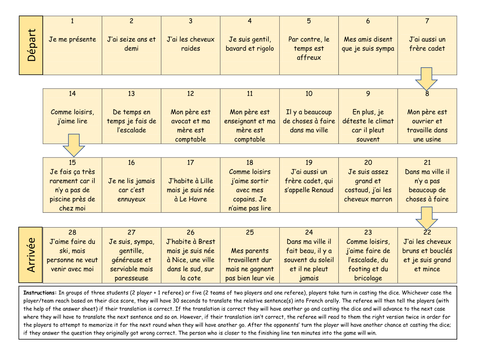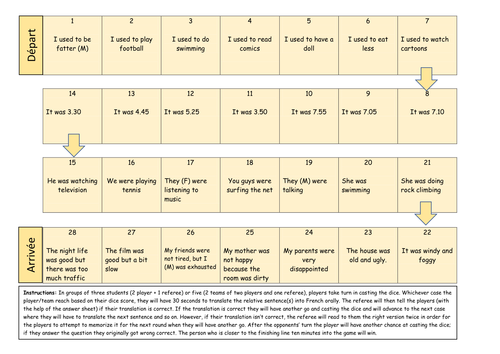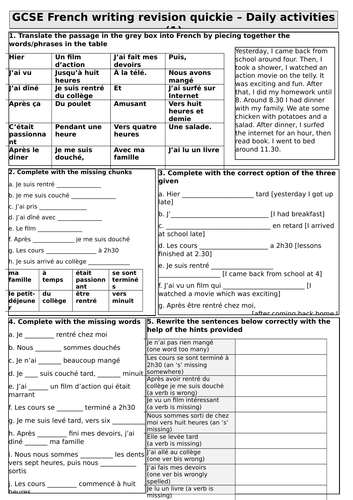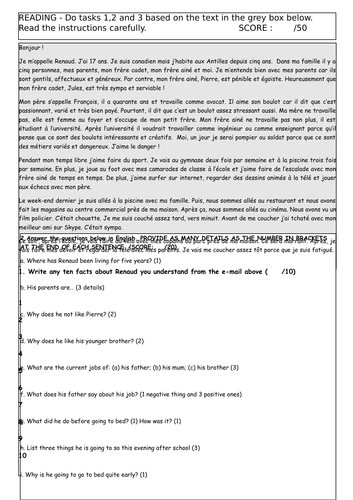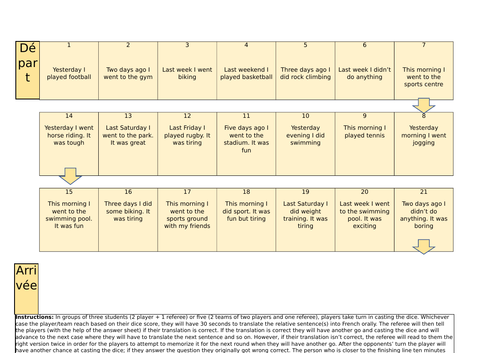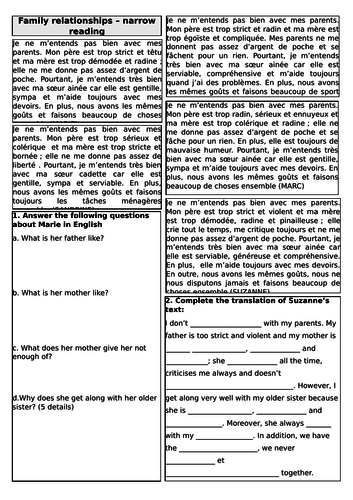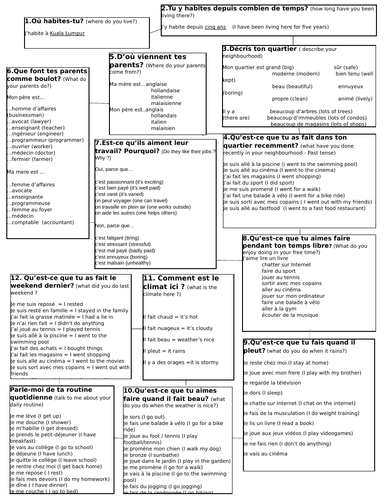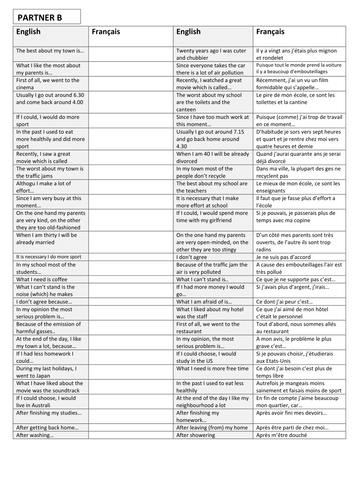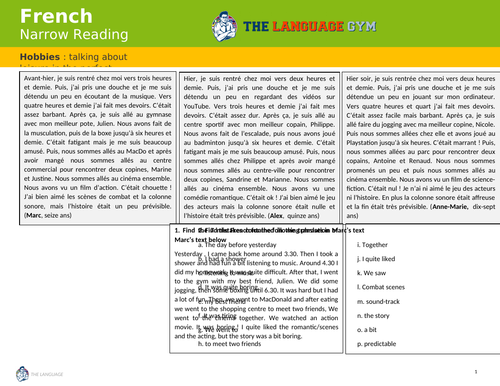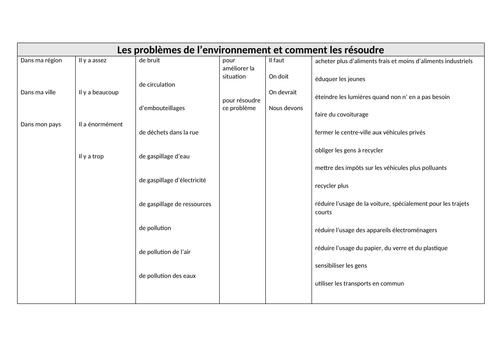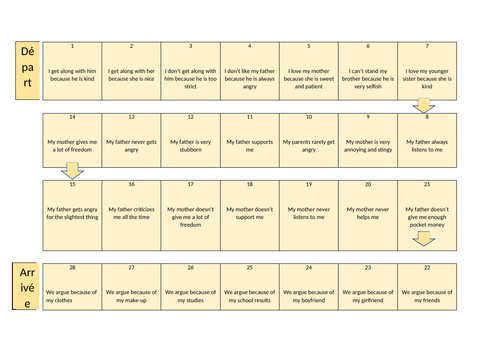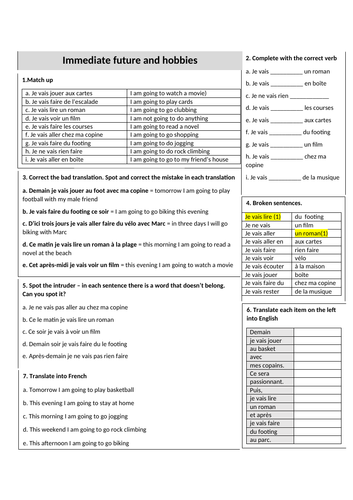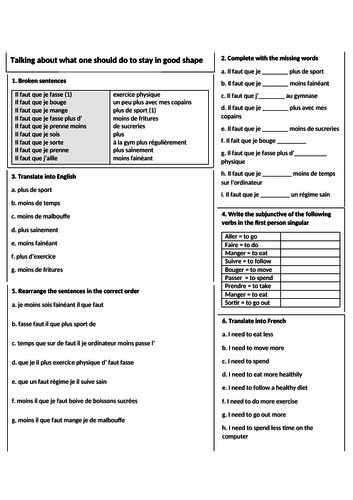
383Uploads
3147k+Views
5744k+Downloads
French

KS3/4 French - Pool of resources on "je me présente" (general personal details)
Three files, all recycling exactly the same vocabulary and patterns:
1. Three narrow reading texts a la Conti with a range of comprehension and an oral task.
2. An oral translation board game from French to English to do after 1
3. A gap fill task
4. An oral scaffold on the topic recycling all of the above
5. An oral translation board game from English to French

KS3-4 French - Collection of 11 oral translation board games on various topics / grammar structures
ANSWER KEY FOR EACH GAME PROVIDED
Instructions: In groups of three students (2 player + 1 referee) or five (2 teams of two players and one referee), players take turn in casting the dice. Whichever case the player/team reach based on their dice score, they will have 30 seconds to translate the relative sentence(s) into French orally. The referee will then tell the players (with the help of the answer sheet) if their translation is correct. If the translation is correct they will have another go and casting the dice and will advance to the next case where they will have to translate the next sentence and so on. However, if their translation isn’t correct, the referee will read to them the right version twice in order for the players to attempt to memorize it for the next round when they will have another go. After the opponents’ turn the player will have another chance at casting the dice; if they answer the question they originally got wrong correct. The person who is closer to the finishing line ten minutes into the game will win.
I do a round in writing (students write on miniwhiteboards or iPads) then one or two orally changing partners each time. Students love it but adequate prep essential.

KS3/4 French - Pool of resources on talking about TV
- reading tasks on opinions about tv
- consolidation activities
- a tile puzzle
- translation practice with answer key
- a sentence builder to introduce vocabulary
- talking mats to scaffold oral interaction with follow-up narrow reading

KS3 French - Oral ping-pong translation: tv programmes and frequency in the present tense
INSTRUCTIONS - The students work in pairs. They have a sheet with two sets of English sentences to translate into French, but Partner A has the French translation of first set, whereas Partner B has the translation of second set. It is called 'Oral ping-pong translation' because they do it orally, Partner A challenging Partner B with a sentence and showing the correct answer to provide them with feedback and to award points (3 for perfect sentence, 2 for one mistake only, 1 if there are mistakes but at least the verb is correctly formed). I give them a time limit (10 minutes); when the time is up the person with the higher score wins. Best to have people of similar ability in each pair. As a follow-up, students to make a note of the most serious mistakes they made in their books so that I have an idea of what their problem areas are. Differentiation opportunities are obvious: different sets of sheets for groups of different ability

2 GCSE French writing quickies on : Daily activities
Two revision quickies which focus on micro-writing skills

KS3 French - Reading comprehension on jobs, opinions and free time (three tenses)
A reading comp meant for my year 7s but can be used with year 8 too. Loosely based on Expo 2 rouge

KS3 French - Pool of resources talking about sport in the perfect tense (first person only)
A sentence builder, a survey, a board game and a vocabulary builder all recycling the same chunks of language

Year 7 French - Aural / Oral activities on Ordering food from Cafe (Expo 1 module 4)
Losely based on Expo 1 module 4, a good range of oral / aural activities

KS4 French - NEW chunk/pattern based family relationships resources (2108 )
A sentence builder,
An oral scaffold
A set of narrow reading texts and tasks
2 vocab builders

KS3/4 French - Oral scaffold for conversations on various topics
A range of scaffolds with and model answers (bilingual version) for conversations on a variety of topics, including:
future plans
television
a past holiday
family relationships x 2
school
myself
general conversation (myself, parents’ jobs, place where I live, etc.)
health

GCSE French revision - Narrow reading texts and tasks on talking about hobbies in the past
Two pages of texts and tasks on talking about leisure/daily life in the past

GCSE French revision quickie (2108) - Perfect tense of irregular verbs
Revision of perfect tense of irregular verbs

KS3/4 French - Pool of resources on Modal Verbs + hobbies (oral and written tasks and games)
Sentence builder + Find someone who + Oral communicative drills + One pen one dice + Written consolidation
Note: same chunks of language recycled over and over again across all resources included

KS3 French - Telling one's age and birthday (sentence builder and follow-up tasks)
A sentence builder with consolidation exercises to do prior engaging in oral pairwork. It models telling your age and that of your siblings

GCSE FRENCH - Environmental issues (sentence builder + consolidation)
GCSE FRENCH - Environmntal issues (sentence builder + consolidation)

KS4 French family - Sentence Builder, Oral scaffold, Oral Transl. game and Narrow reading
Oral scaffold, Oral Transl. game and Narrow reading all recycling exactly the same chunks of language

KS3/4 French - Four new chunk-based revision quickies on Family relationships
4 chunk-based revision quickies on the topic ‘Family’ recycling the same chunks over and over again

KS3 French - Talking hobbies in the immediate future (sentence builder, vocab builder and reading)
A sentence builder, a vocab builder and narrow reading texts with two pages of tasks to exploit them

KS3/4 French - Health: talking about what I should do to be in better shape
A sentence builder and two pages of vocab building tasks recycling its content. All chunk-based

